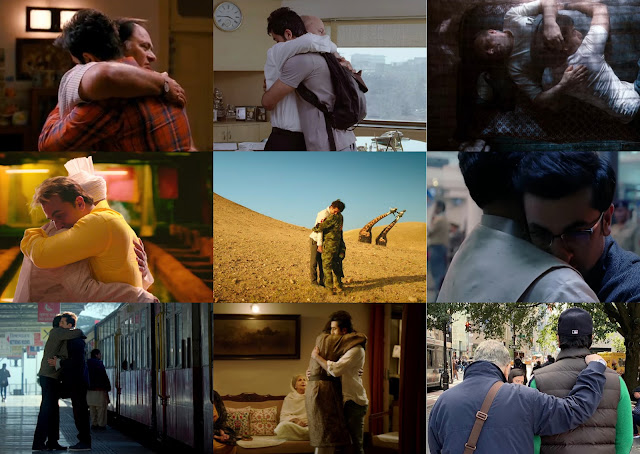By Pankaj Sachdeva
Ranbir Kapoor has often spoken and written about his reverential and formal relationship with his father, Rishi Kapoor. In the foreword that he wrote for his father’s biography Khullam Khulla: Rishi Kapoor Uncensored, he says, “I am closer to my mother. I feel that Dad modelled his relationship with me on the one he shared with his own father. And it is true that I have never crossed a certain line with him. But there is no sense of loss or vacuum here. I do wish sometimes that I could be friendlier with him or even spend more time with him.” He also mentioned that he was scared of his father as a kid. However, he became closer to him during his father’s last years when he was being treated for cancer.
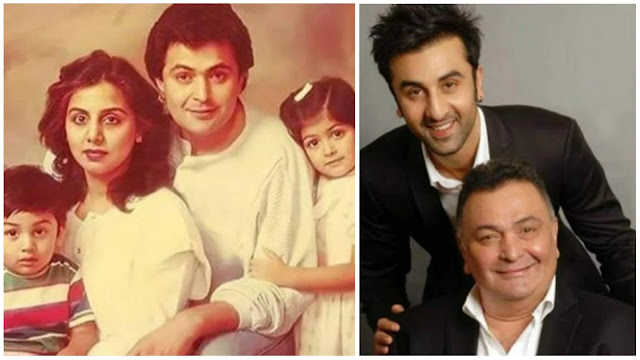

Relationships with fathers, whether loving or fraught, are present across the breadth of Ranbir’s filmography. These include the ones with both his real and reel fathers. There have been many films where Ranbir’s relationship with Rishi Kapoor is mentioned. In Ranbir’s debut film Saawariya, Sanjay Leela Bhansali makes it abundantly clear that Ranbir is related to his father and grandfather. Ranbir is named Raj after his grandfather Raj Kapoor. The bar in the film is named RK bar. Raj’s cap is the awara cap, made famous by Raj Kapoor’s Awara. At one point in the film, Raj says, “Main ek dum awara hun.” When the song Saawariya in the filmstarts, Raj asks the audience, “Doston, kya aapne kabhi kisi se pyaar kiya, maine bhi kiya” referring to the memorable line of his dad, Rishi Kapoor, from the song Meri Umar Ke Naujawaon from Karz. Ranbir’s second film, Siddharth Anand’s Bachna Ae Haseeno, was titled after his father’s famous song from Hum Kisise Kum Naheen. Ranbir also paid tribute to his father by recreating the song in the film. A few years later, Ranbir also worked with his parents in Abhinav Kashyap’s Besharam.

Ranbir has also done many films where his character’s relationship with his father is part of a major plotline. Ayan Mukerji has made three films with Ranbir, and in all three, there is a depiction of a father-son relationship. In Ayan’s first film, Wake Up Sid, Ranbir plays Sid, a spoilt and directionless lad living off his parents’ wealth. He has no aim in life. His father, Ram Mehra (Anupam Kher), wants his son to join their business of bathroom furnishings. He tries to bribe Sid with a Porsche if he comes to the office for a month. However, Sid does not last more than a week as he has no interest in joining Flower Showers. After failing his college exams, Sid fights with his father and moves out of his house. He moves in with his friend Aisha (Konkona Sensharma) and finds a calling to become a photographer. When he finds a job at a magazine, he meets his father. Sid realizes that he got this skill from his father, who was also a photographer once. His father told him that his purpose in taking photography was to click his son’s pictures. Once Sid grew up, he stopped. His father is happy about his achievement and advises him to put his heart into whatever he decides to do. Sid gifts his first paycheck and reconciles with his father. Sid finally wakes up.
Perhaps, the most wonderful of the relationships between a father and a son is depicted in Ayan’s Yeh Jawaani Hai Deewani. Ranbir plays Kabir, also called Bunny, a wanderlust-afflicted young man who wants to travel the world. His father, Sanjay Thapar, played with absolute charm by Farooq Sheikh, does everything for him. There is a touch of rebellion, with an equal amount of love and concern between the two. On one side is Bunny, who wants to live independently and on his own terms, but at the same time, he does not want his father to worry for him and does not want to disrespect him. On the other side is his father. He wants Bunny to live his life fully, but at the same time, he worries for him a lot. He wants Bunny to do whatever he wants, but at the same time, he silently cries because he does not wish Kabir to leave him and go to Chicago. It is portrayed so beautifully because, in some ways, relationships with parents are—complex, awkward, and loving. Bunny gets to live his wish, but he gets so engrossed in his life that he misses the news of his father’s death and does not come to his funeral. But his stepmom tells him that he gave his father the most happiness, so he should be proud of it. “Kyunki tumne kabhi khwaabon ka peecha nahi chhoda, apni zindagi apni marzi se jee, woh jaante the apni marzi se jeene ki keemat kya hoti hai.”


In Ayan’s most recent magnum opus, Brahmāstra: Part One – Shiva, Ranbir plays Shiva, a disc jockey living in Mumbai. He soon discovers that he can control fire and is related to the secret society of guardians responsible for protecting the greatest astra in the universe—the Brahmastra. The film is based on the theme that love conquers all. Shiva’s mother, Amrita, had died protecting him when he was a young child. He does not know much about his father, as he disappeared before his birth. He calls him Mr. India. Shiva then finds out that his father was named Dev, who went rogue and was trying to get the Brahmastra for himself to become powerful. The first part ends with Dev getting a new lease of life, and the second part is likely to be a conflict between the father and the son duo, fighting the good and the evil battle.
Anurag Basu’s Barfi! had another charming portrayal of father and son. Ranbir played the titular role of Barfi, a deaf and mute boy living in Darjeeling. His mother died during childbirth, after which his father, Jungbahadur Johnson (Akash Khurana), brought him up. He has a close relationship with his father, as they sometimes sleep hugging each other. Barfi often troubled his father with his tricks, asking for money. There is a heartbreaking scene where his father suffers a cardiac arrest and calls for help. However, Barfi is unable to hear him. The money needed for his father’s treatment forces him to loot a bank and kidnap Jhilmil (Priyanka Chopra). Ultimately, it proved futile as his father passed away.
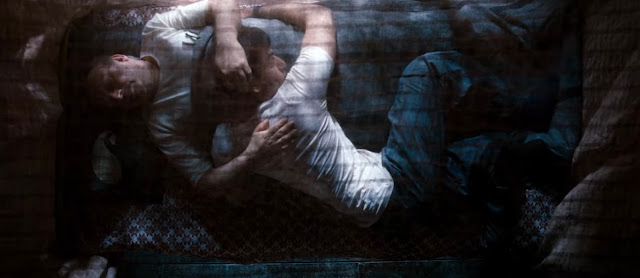
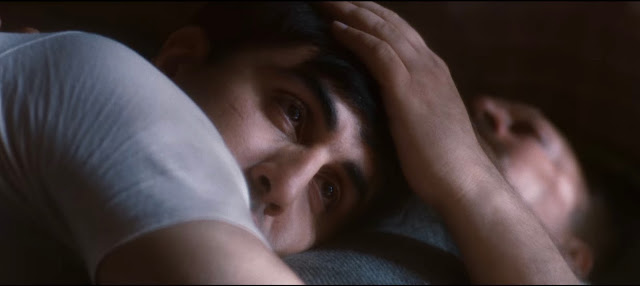
Father and son appear again in Anurag Basu’s delightful Jagga Jasoos, where Ranbir plays a young detective Jagga. Jagga was adopted by Badal Bagchi (Saswata Chatterjee) when he was a kid. Badal, whom Jagga also refers to as Tutti-Futti, disappeared after admitting his son into a boarding school. Jagga’s only contact with Badal is a videotape he receives yearly on his birthday. Jagga then decides to find his father and ultimately reaches the mythical land of Shundi, where he is united with his father. The relationship between the father and the son is close like it was in Barfi!.
Ranbir has another lovely relationship not with his father but with his grandfather in Shimit Amin’s little gem, Rocket Singh: Salesman of the Year, where he plays Harpreet Singh Bedi, a budding salesman working for a computer company. He lives with his grandfather P.S. Bedi (Prem Chopra). They share a sweet relationship where his grandfather raised Harpreet all by himself. He wants Harpeet to do well in life, so much so that he even breaks his savings to gift him a scooter. When Harpreet’s scam of establishing a company-in-a-company is revealed, his grandfather admonishes him for acting like a thief. Harpreet responds that it was because he did not teach him how to do a thief’s work; if he’d taught him, he wouldn’t have become a thief. It shows how important an upbringing affects a person’s actions.

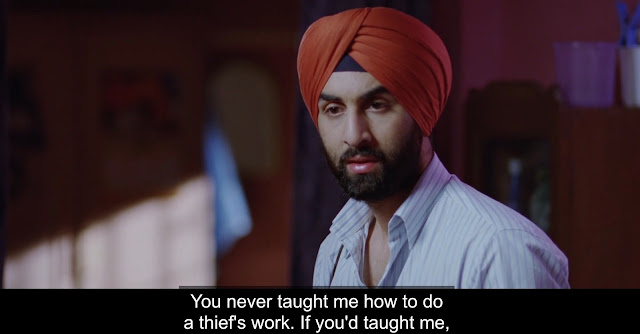
In Siddharth Anand’s Anjaana Anjaani, Ranbir played Akash, a Wall Street investment banker dealing with depression after suffering huge losses during the 2008 financial crisis. He decides to take his life. He meets Kiara (Priyanka Chopra), who is also suicidal, after discovering that her fiancé cheated on her. After going on a road trip, they both come out of this depressive phase. Akash finally calls his father and speaks to him after years. In Prakash Jha’s Rajneeti, Ranbir plays Samar, the son of a politician Chandra Pratap (Chetan Pandit). He is pursuing is Ph.D. in English literature in the US and comes to visit his family. Unlike his brother and father, Samar is not much interested in politics. However, his father loves him even if he does not have enough time to talk to his son. There is a scene where his father accompanies him to the airport. Before he leaves, he says he does not know when he will see them again. And, like in other films, Samar and his father share a hug. His father’s prophecy turns out to be true, and he is shot dead by a rival. Samar returns to support his family and avenge his father’s death, eventually becoming Arjun of the Mahabharata.


Ranbir portrayed actor Sanjay Dutt in Rajkumar Hirani’s hagiography Sanju. The film deals with Dutt’s relationship with his parents—Nargis (Manisha Koirala) and Sunil (Paresh Rawal), his drug addiction, and his arrest for illegally possessing firearms. In this film, the father-son relationship also forms the film’s core. Sunil is his protector, saving Sanju from many crises. The film also recreates the Jadoo Ki Jhappi moment from Hirani’s Munna Bhai M.B.B.S., where Sanju and Sunil hug each other. Sanju comments that even after the director spoke cut, the two of them did not let go of each other for a few more moments. Sunil passes away before hearing a speech that Sanjay wrote for him. Towards the end, Sanjay tells his children not to be like him but like Sunil. His life was struggling, but Sunil made him a great actor.
In Imtiaz Ali’s Tamasha, Ranbir plays Ved, a storyteller hiding under the garb of a corporate product manager. He took the conventional path of studying engineering as his father, Brij Mohan Sahni (Javed Sheikh), reminded him of his duty to make a life for himself. Ved could not clear the engineering entrance exams, and his father had to give a donation for his admission. Ved then joins the corporate rat race. However, Tara (Deepika Padukone) makes him realize that he is losing his excellence while working in a job where he feels stuck. Ved undergoes a mental and emotional breakdown and eventually gets the courage to tell his father that he is happy being a storyteller. He will choose the end of his hero’s story and not live a life running in the rat race. Beacuse it is his story; apni kahani hai, ending change kar lenge.
Karan Malhotra’s Shamshera is yet another father-son story where Ranbir plays a double role of father and son. The film is the story of Shamshera (Ranbir Kapoor), the leader of Khameran tribe, set in the nineteenth century. Shamshera is trapped in a fraudulent peace-keeping deal by the British officers, leaving him and his clan in a state of oppression. He is eventually killed and branded as a traitor while trying to escape captivity. Shamshera dies just before his son Balli (Ranbir Kapoor) is born. Balli has no fondness for his father, even though he has a striking resemblance with him. In fact, Balli wanted to join the police, supporting the same force that kept his tribe oppressed. However, as the truth about Shamshera’s goodness is revealed, Balli takes up the leadership of the tribe and finishes his father’s task of obtaining freedom for the Khamerans. Shamshera again depicts the central role of the father in a Ranbir film.

Thus, we see that in more than a dozen films of Ranbir, fathers play a pivotal film. And, he often aces with them with aplomb. Perhaps, it has something to do with his own lived-in experience. A few days ago came the news that Ranbir had become the father of a little girl. It will be worthwhile to see him in the role of a real father and, hopefully, a reel father on the other side.
[Read more of the author’s work on his blog here]

